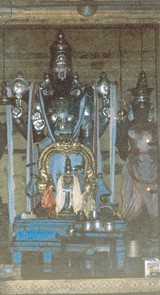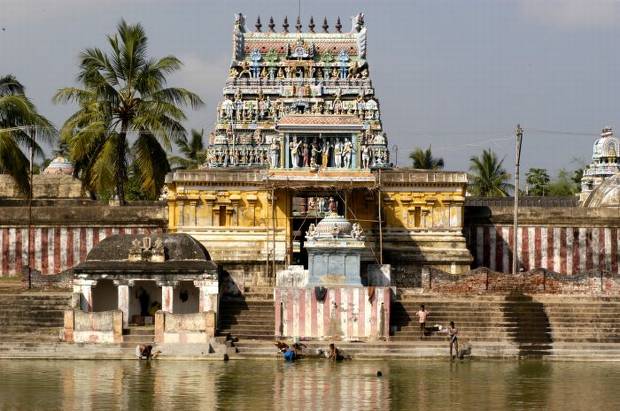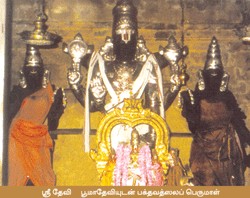


| Dieties | Bhakthavatsalapperumal, Abisheka Vallith Thayar |
| Theerthangal | Darshana Pushkarini |
| Vimanam | Udhbala Vimanam |
| Mangalasasanam | Thirumangaiazhwar |
| Direction and Posture | Standing Posture and East-faced. |
| Travel Base | Thiruvaarur |
| Access to the temple | About 4 miles from Thiruvaroor Station. |
| Features | There was found a bee-hive in the sanctum sanctorum of the Goddess for many years but not now. |
Today’s lecture is from Thirkkannamangai, one of the 108 Divya Desam and one of the five Sri Krishna Kshetrams. The Divine marriage of Sri Narayana and Sri MahaLakshmi is believed to have been held here and so this place is also called Krishna Mangala Kshetram. The Lord here has Sri Perumpurakkadal and Sri Batharaavi Perumal as Divine names. His Consort is called Sri Abhishekavalli Thayar. Garuda is prominent here. Long ago when the milky ocean was churned, Sri Lakshmi appeared. She wanted to marry the Lord, Vishnu, but felt shy to get married in front of all the crores of gods [Devas]. So the Divine couple selected this quiet place for the marriage. She did penance at the banks of the temple tank- Darsana Pushkarini- and the Lord fixed an auspicious date for the marriage. But here also the gods arrived to witness this Divine event. They took the forms of honeybees and had a glimpse of the marriage. Even today one can see bee hive in the Thayar sannidhi. Thirumangai Alwar has composed eleven hymns in praise of the Lord here. The lecture is from the banks of Darsana Pushkarini, a mere sight of which absolved the Moon god from his sins.
In the last sloka Arjuna submitted himself at the feet of Sri Krishna, Who thought why not Arjuna select his own remedy and solve his predicament. The 8th sloka details Arjuna’s reply:
na hi prapasyami mamapanudyad
yac chokam ucchosanam indriyanam
avapya bhumav asapatnam rddham
rajyam suranam api cadhipatyam
"I can find no means to drive away this grief which is burning up my senses. I will not be able to dispel it even if I win a prosperous, unrivaled kingdom on earth with sovereignty or one like in heaven."
Arjuna sees his beloved ones like Bheeshma and Drona on the enemy camp ready to fight and this sight dries his sensual organs like eyes and tongue. He is engulfed in anguish and finds no cure. Our forefathers convey us a great lesson here. One hears the words chithai [pyre] and chinthanai [brooding]. Chithai or a pyre is used in the cremation grounds for burning dead bodies. Whereas, chinthanai or brooding will burn out a living person. Here brooding burns Arjuna. Once sage Narada met sage Sanatkumara and requested him that though Narada had mastered all available literature but wanted Sanatkumara to preach him that which will dispel his anguish and sorrow. In reply Sanatkumara asked Narada to first tell what all he knew. Narada started telling his knowledge in the Vedas, Upanishads, all types of Shastras, etc. Sanatkumara said that Narada had studied all and there was nothing, which could be preached to Narada. This gave the hint to Narada, that he had merely studied all these without practicing or understanding the inner significance of these literatures. Worry lines appear on the forehead. But a person who has understood the God will have no such lines on the forehead. Thus Sanatkumara dispelled Narada’s worries. So one should never get worried. Hanuman, when dispatched for searching Sri Sita was wondering why Sri Rama was so worried at the loss of a mere wife. Being a bachelor, Hanuman might not have understood the role of a wife. But the same Hanuman, when saw Sri Sita, then wondered how Sri Rama was still alive after losing such a noble and righteous wife. Here, Valmiki the author of Srimad Ramayana, observes that no enemy on earth could ever kill Sri Rama and only worry had the power. Arjuna, therefore feels thoroughly handicapped by his worries, and seeks help from Sri Krishna. It was opined by Sri Krishna that no distress is there which remains forever. Even death of a dear one is forgotten after a few days or when a happier incident is encountered. So if Arjuna got back his kingdom, this grief of killing the relatives will vanish. But Arjuna says that all the so called happiness one may get by acquiring a kingdom, like music, dance, food, etc., will remind him these sins he is to commit and make him miserable. Perhaps a small kingdom, or one with enemies around or one that is stuck by poverty and famine may cause worries for the rulers. So Arjuna qualifies that even if the entire world was reigned, with no enemies and totally prosperous, will never clear him of his grief. Further, he says that even if he gains the control of the heavenly kingdom, he is unable to find the way to dispel his grief.
No comments:
Post a Comment